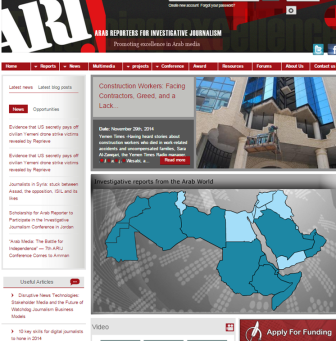 Editor’s Note: This weekend, journalists from across the Middle East and North Africa will gather in Amman for the seventh annual forum for Arab investigative journalists. The three-day conference comes as the region’s news media is under assault as never before. In part two of our series this week, Rana Sabbagh, director of Arab Reporters for Investigative Journalism, looks at the alarming loss of media freedom across the Middle East.
Editor’s Note: This weekend, journalists from across the Middle East and North Africa will gather in Amman for the seventh annual forum for Arab investigative journalists. The three-day conference comes as the region’s news media is under assault as never before. In part two of our series this week, Rana Sabbagh, director of Arab Reporters for Investigative Journalism, looks at the alarming loss of media freedom across the Middle East.
The lights of free speech are being steadily extinguished across the Arab world, heralding a new era of ignorance, intolerance, and repression.
Saddest of all, the majority of Arabs — who saw free speech as the only gain from the Arab Spring upheavals – now seem willing to accept the loss of this universal human right, in return for promises of stability and economic prosperity.
The chaotic trend across much of the region, with states collapsing in Libya, Yemen, Syria and Iraq, is also allowing emboldened leaders to restore the old order.
Security, not democracy, is now the top priority for a critical mass of Arabs. Gone are the popular slogans of the past four years: social justice, rule of law, ending endemic corruption, democratic values, the right to information and professional media.
It may be generations before independent voices are heard again in the Arab world.
Alarmingly, an alliance of governments, private media businesses as well as the ordinary public has set itself against dissenting voices which are portrayed increasingly as a threat to state security.
So has journalism in the region become an impossible job?
In many ways, yes.
Journalists, writers, and academics who challenge the official narrative face censorship, arbitrary trials, and violence. Many journalists have given up the struggle for a mix of reasons: out of fear, or an opportunistic desire to please the new rulers in return for personal gain.
What is to be done? I am afraid nothing much. The few brave journalists, bent on serving their society as watchdogs, will continue the battle for media independence alone – and at high cost.
The row-back on media freedom and human rights has been most visible in Egypt, now the third most dangerous country for journalists after Syria and Iraq.
An upsurge in domestic terrorism has strengthened Cairo’s argument for a crackdown on the press and human rights – but the measure has broad public support.
Days after more than 30 soldiers were killed in two militant attacks in Sinai, editors of 17 state and privately-owned media were encouraged to pledge support for the government’s anti-terrorism policies and banned criticism of the police, army, and the judiciary in their publications and news broadcasts.
Surprisingly, though, they didn’t have it all their own way. In response, some 600 Egyptian journalists used online social media to reject their editors’ position and protest against further censorship.
But still, the intimidation goes on.
Last month the chief editor of France’s Le Monde Diplomatique, Alain Gresh, a frequent visitor to Cairo, was held for two hours, along with two Egyptian journalists, after they were overheard discussing politics by a woman in a café who called the police. Seven journalists have been killed in the country since June 30, 2013 and at least 17 more are currently imprisoned for their work, including Al Jazeera English staff Peter Greste, Mohammed Fahmy, and Baher Mohamed on charges of spreading “false news”.
Similar types of pressure are being employed against journalists elsewhere in the region.
Jordan, like most Gulf Arab states, is embracing a “zero-tolerance” policy towards anyone opposing its involvement in the US-led coalition against the Islamic state of Iraq and Syria (ISIS).
In the last few days, police arrested the deputy head of the country’s Muslim Brotherhood for criticizing the UAE’s decision to name the movement and its local affiliates a “terrorist group.” Amman’s state security prosecutor accused him of harming ties with “a friendly state.” The UAE is among Jordan’s financial donors and more than 200,000 Jordanians work there.
In October, the Jordan’s Media Commission asked radio and television stations not to report on military affairs without seeking prior permission from the army. Otherwise, they risk violating the 1971 State Secrets law. Weeks ago, the army announced the appointment of a spokesman to handle media requests.
In addition, a new anti-terror law has come into force, with the potential to turn any opponent into a terror suspect. Jordan has also blocked over 260 news websites on the grounds that they failed to obtain the required licenses. They include 7iber, a site that promotes media freedom.
In Syria, local and foreign journalists are deliberately being targeted by the regime as well as militant Jihadi groups.
More than 110 reporters have been killed since March 2011 and more than 60 are currently detained. Under threat from all sides, the Syrian media are fleeing the country in droves. Foreign correspondents rarely travel to Syria. The result: ISIS-controlled areas have become information “black holes” from which little or no news coverage is emerging, while several Arab and foreign journalists have been beheaded.
In Lebanon, where newspapers and TV serve as the propaganda outlets for businessmen and politicians, the Syrian crisis has reinforced the polarization between pro-Shiite media and those supporting the Saudi-backed Sunni coalition.
In both Libya and Yemen freedom of information is under threat from violence that continues to rock the countries.
Yemeni journalists face increasing threats and violence from all sides but especially from Houthi rebels who took over the capital last September. According to the Yemeni NGO Freedom Foundation, 33 journalists and 19 news media organizations were targeted by the group.
Against this gloomy background, the 7th annual forum of Arab Investigative Journalists opens in Amman on December 5, 2014.
More than 320 Arab journalists, editors, and media professors — out of 1100 trained by Arab Reporters for Investigative Journalism (ARIJ) since 2005 — will debate the worrying regression in freedoms across the region and a growing wave of disinformation and character assassination. They are stars lighting up Arab skies and setting the bar for professional media that speak truth to those in positions of power, holds them accountable, and improves peoples’ lives.
How can Arab journalists win the battle for independence?
We need to answer that question while we still have the right to ask it.
 Rana Sabbagh is executive director of Arab Reporters for Investigative Journalism (ARIJ), the leading media support network promoting “accountability journalism” in newsrooms and among editors and professors in nine Arab states: Jordan, Syria, Lebanon, Egypt, Iraq, Palestine, Bahrain, Yemen, and Tunisia. She is a member of the GIJN board of directors.
Rana Sabbagh is executive director of Arab Reporters for Investigative Journalism (ARIJ), the leading media support network promoting “accountability journalism” in newsrooms and among editors and professors in nine Arab states: Jordan, Syria, Lebanon, Egypt, Iraq, Palestine, Bahrain, Yemen, and Tunisia. She is a member of the GIJN board of directors.

